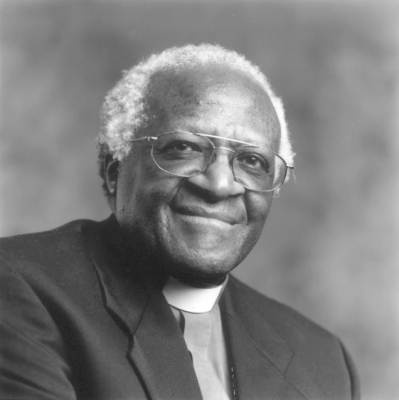
An iconic Nobel laureate and a veteran human rights activist, Archbishop Desmond Tutu is known for tirelessly spreading peace, justice and democracy in South Africa. Both the black majority and white minority considered him the nation’s conscience. “Sometimes strident, often tender, never afraid and seldom without humour” is how he was described by his longtime friend Nelson Mandela.
He was born in 1931 in Klerksdorp, Transvaal, South Africa. His father was a teacher and his mother was a domestic worker. Young Tutu was baptized as a Methodist, but the entire family later joined the Anglican Church. He was educated at Johannesburg Bantu High School. Though he wanted to study medicine, his parents could not afford it. So he became a teacher but resigned later to protest against the Bantu Education Act, which lowered education standards for black students.
Tutu was ordained an Anglican priest in 1960 and left for England to pursue theological study. Having taught theology for few years, he was appointed Dean of St Mary’s Cathedral in Johannesburg. From 1976 to 1978 he was Bishop of Lesotho, and in 1978 became the first black General Secretary of the South African Council of Churches and began to establish the organization as a major force in the movement against apartheid. His voice was a powerful force for non-violence in the anti-apartheid movement.
Under Tutu’s leadership, the council established scholarships for black youths and organized self-help programmes in black townships. He spoke out against the establishment of tribal “homelands” and used the council as a platform to urge foreign investors to pull out of South Africa. He often used to say, “If you are neutral in situations of injustice, you have chosen the side of the oppressor. If an elephant has its foot on the tail of a mouse and you say that you are neutral, the mouse will not appreciate your neutrality.”
As the government became gradually oppressive detaining black people, establishing arduous laws – Tutu became increasingly outspoken. In his human rights work, he formulated his objective as “a democratic and just society without racial divisions”, and set forth demands for its accomplishment. He coined the term “rainbow nation” to describe the new South Africa emerging into democracy. The Peace Foundation, which he launched in 2015, aims at extending his vision for a peaceful world in which everyone values dignity and interconnectedness.
Tutu’s most characteristic quality was his readiness to take unpopular positions without fear. He spoke against President Ronald Reagan’s policy of ‘constructive engagement which was intended to show impartiality in South African domestic affairs. He even criticized his own government for backing Zimbabwe’s president, Robert Mugabe, who had a long record of human rights abuses. He was arrested several times for raising voice against the government.
Tutu’s moral leadership, combined with his winning personality and unyielding ideals made him something of a global celebrity. The Nobel Peace Prize in 1984 is just one among numerous awards and recognitions bestowed on him. Apparently convinced of the virtues of modesty, he never seemed to accustom himself to the perquisites of fame and high office.
“Do your little bit of good where you are; it’s those little bits of good put together that overwhelm the world” is the firm conviction and living testimony of Archbishop Desmond Tutu who is remembered globally for his holy activism and righteous indignation against every form of injustice.
Credit : Dr. Sajith Cyriac (The Teenager Today)
Picture Credit : Google




